Above the Clouds
This morning began bright and early, though not as early as we’d originally planned. Weather forced us to push back our sunrise hike and make it a sunrise drive instead. Islands of mountains appeared over the clouds at the heights of Mt. Pisgah. Bumblebees and honey bees were waking with us. We could hear them down in the wildflowers along the side of the mountain. Behind us, ravens kra-a-a-kra-a-acked and hawed as they left their snag, a Canada warbler sang a sunrise song, and a fledging junco landed in the joe pye weed just a few feet away, its parent not far behind.

We returned to camp and prepped for the day, adventure waiting for us, despite the rain and chill.
Along the Mountain Trail
We took an easy morning in camp, but prepared for all the things: hikes, journaling, swimming with the salamanders, and dinner in a warm restaurant. Luba later reflected on the challenges of being ready for five changes with one bag and seven minutes to work it out.
Hiking to Skinny Dip Falls, we made our usual educator pace of 0.10 miles per hour. Megan stopped us to show us how to forage cucumberroot. Giving a nod to the People who made good use of the natural world, she explained that early Natives would harvest this tasty tuber in season, eat it raw or add it to other foraged foods. Meticulously slicing a single inch-long root into more than 12 pieces, she offered everyone who wanted a taste of something sweet, crunchy, and watery, growing wild at our feet.
Skinny Dip Falls were quite an eye-opener. The falls are virtually gone, washed away and changed in the last major tropical storm to cross the mountains, Fred in 2021. Storms are incredibly powerful and change the landscape quickly and thoroughly. As our climate changes, through both natural and human action, the storm damage increases, impacting humankind both socially (where we live, how we live) and economically (how we spend tax dollars to compete with nature). As Rich pointed out, nature will always win. It was abundantly clear to everyone in the group that our relationship with this earth must change, because the earth itself will change us whether we are ready for it or not. No one is isolated from the impact of human action on the land. We are just a small part of the community.
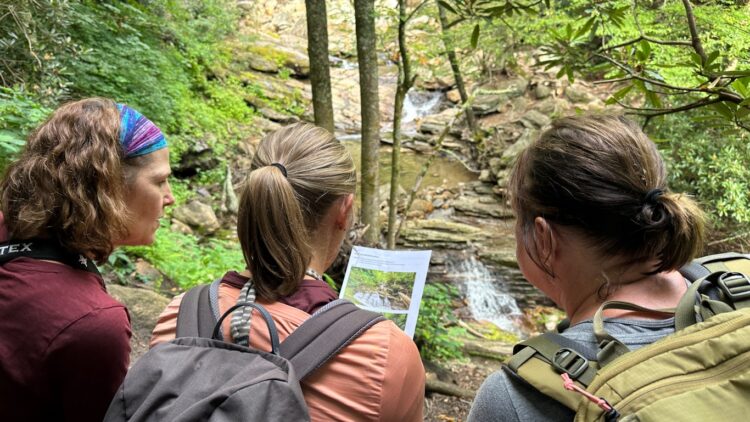
In the Mountain Field
Stopping at Graveyard Fields, we took some time to enjoy the sun and sit with the wildflowers. Each team of three was given the freedom to find a patch to observe and collect data on the pollinators that visited, then represent the data for others in graphs and infographics that seemed to match our goal. In about 20 minutes (yes, Luba, you have 20 minutes to get this done!), each group came up with interesting observations and hypotheses, as well as a visual way to present the information to others through graphs and diagrams. This simple action of collaboration and quiet was a highlight for many of us.
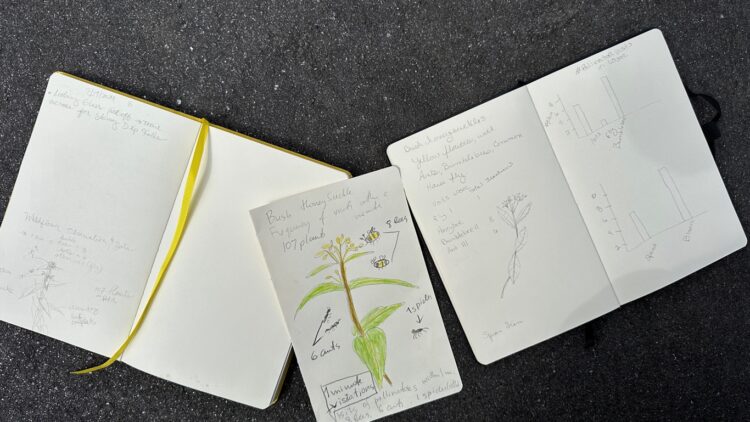
Down the River
We left the Blue Ridge Parkway and headed into the Pisgah National Forest above Brevard. Sitting in the shade of sycamore trees, we took our delicious box lunch while we waited for Lori Williams from the NC Wildlife Resources Commission to arrive with a very special friend, Rocky the hellbender.
For many of this, this was our first experience with a two-foot long salamander that has the reputation of a preacher on fire. We learned that the hellbender got its name from enslaved people in Virginia, who saw the creature as a devil bent on returning to hell, and maybe taking a few folks with him. Truth is, Rocky was pretty chill. We all hung out by his kiddie pool and peppered his caretakers with questions about his particular species. Pro tip for hanging with Rocky: he likes his back stroked and his folds scritched.
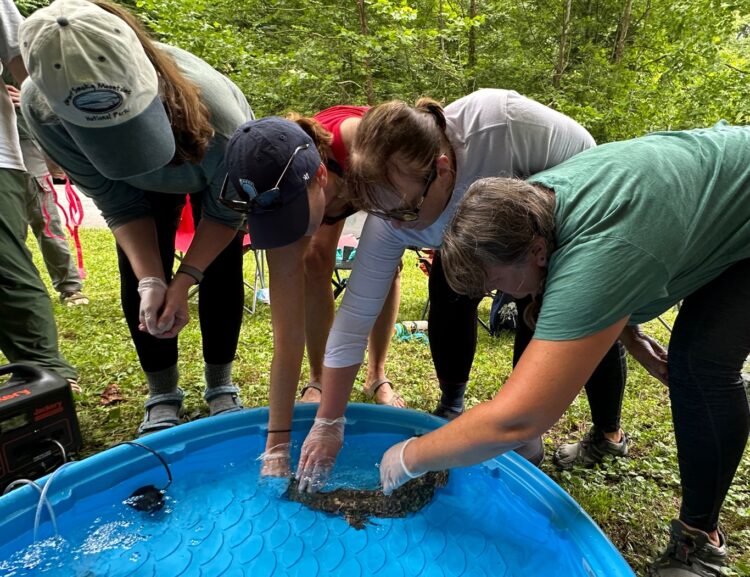
Finally, our group geared up in double and triple layers to get into the water with Ben the Biologist. For some of us, this was probably the most challenging part of our trip. The water would be cold, and we were told this very early in our preparations, way back in March at our orientation meeting. As I’ve gotten older, I’ve become less tolerant of the cold and I dreaded getting into the cold water for any real length of time. I’ve given myself permission to tap out when something felt too much, not something I would ever easily do. But challenging ourselves is has been at least part of the point of this trip, right?
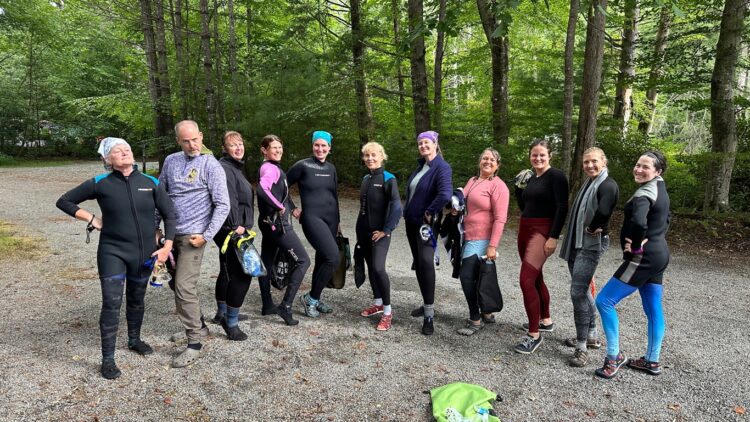
Into the drink with Ben we all went. We quickly discarded the high tech gear meant to locate tagged hellbenders for an underwater search with flashlights and snorkels. Soon we spotted blueish eyes below a rock, then a tail below another, and another. Crayfish as big as a hand scuttled backward and a small school of stonerollers floated together in a pool of fast-moving water, surprised at their human visitor. A fingerling trout or two and some sculpins here and there made it seem as if we were in another world, a secret place below the surface of the river where the water is the atmosphere, the rocks a new earth. It was fascinating, exciting, and the cold was forgotten.
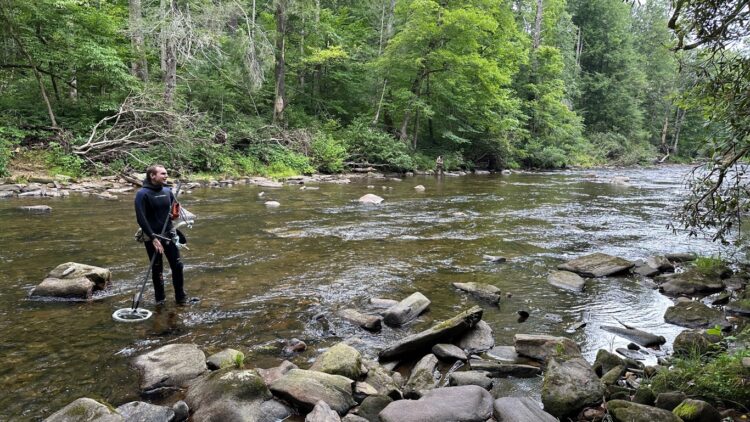
Rich took some time out to educate some curious tubers who wondered what we were up to. Moments like this are important to educators. It seems a gift to have the opportunity to feed another’s curiosity and perhaps help them to see their world less singularly.
As for my personal challenge, I think I beat it for the time being. I left the water earlier than many others, but not because of the cold. I’m certain I would have stayed much longer. Rather I felt that I had seen what I had come to see. The fish, crayfish, and hellbenders had tolerated us long enough. We were guests in their world and I felt that I was beginning to overstay my welcome.
I’ve had that sense a few times on this trip. Though I am hungry for all knowledge of natural things, there are times that I feel I am invading a place that is not mine to haunt. I think this is one of the great challenges of educators and naturalists. How do we walk the balance between action and interaction in the face of the great changes coming our way? Yet, if we do not learn the secret stories of the earth, speak them to the tubers who wonder and the stackers of rocks who don’t understand the world they are disrupting, tell these tales in classrooms and hallways… who will pass them on to others? If not us, who?
Under the Table
Supper was in Brevard, a warm and welcoming place where we could reflect and relax with good food and new friends. Dolly’s ice cream was the cherry on top before we drove back to camp. It had been pouring rain solidly for nearly an hour while we dined, the kind of rain that makes you really glad you are not in a tent. We thought we had escaped a sound drenching in camp, and we clambered back into our vans and spiraled up the roadway toward a good night’s sleep. Rounding a corner, we came to a slow halt behind several other vehicles. A tree had fallen across the road, blocking traffic in both directions. Our team piled out to see how we could help. Perhaps a group effort could move trees, not just mountains?
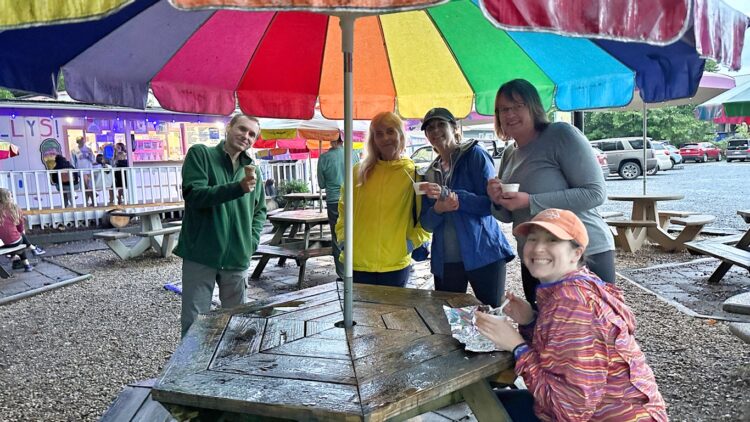
A young man already had his chainsaw out, but he was struggling in the drizzle to get it running. Suddenly, Rich, the Fixer, strode up with his little 10-inch trail saw, the kind that folds up like a pocket knife. He got to work on the lower branches, taking the occasional turn with a fellow traveler, a strapping guy who cheered Rich on. In under ten minutes the pair had three branches the size of your thigh sawed off the base of the trunk. With seven or eight people on each, the branches were tossed over the guardrail, creating a one-way passage around the trunk, still tilted and sloping down the mountain and over the other lane. We left that part for DOT and climbed back into the vans, grateful for a glimmer of the best of humans.
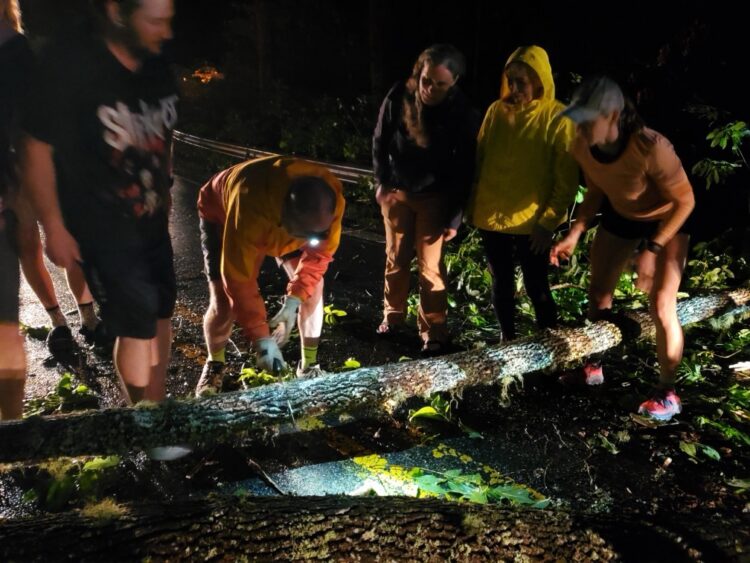
May it be that we ever remain hopeful and helpful to one another.
